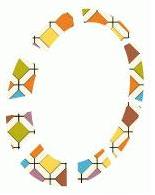Tensions, energy, power and the use of force
Smyth and Berg write "although there is minimal discussion of conflict in the literature on internal group processes, in the literature on relations among groups, there is little discussion of anything other than conflict." (p 153, their emphasis). The Lucifer Principle and Global Brain are also full of conflicts, figths and power struggles. The paradox of power arises with the paradoxes of scarcity - resource shifters - and perception - inner judges - and is mediated by the conformity enforcers. It is no coincedence that the word enforcer is being used. They contain the forces that shape groups. Tensions emerge from situations that lack resources, energies from the perceptions we have from each other and power from the excersice of power itself.Power is more than an attribute of the relation between people and groups. In fact, power is the way nature maintains relations between entities. Power is process. In physics, every interaction between particles is associated with tension, power, a force (field) and energy. So, culture reflects nature, also in culture: power is the means and the goal. There is no surprise to find that the exchange of words and symbols is also part of power play. Every exchange between people and / or groups can only be understood by the relations between them, that is, by the power.
There is a difference between power and force. Both can be used to influence actions, but power also influences possible actions, while force influences actual actions. "The conceptual structure of power differs from that of force in its setting of one crucial parameter, namely realized/latent, with force marked as realized and power marked as latent. The latency and diffusion of power requires it to be treated as residing in a relation, rather than in individual entities. In contrast, force, while it perhaps could be treated in the domain of relations, is more often considered as emanating from some individual entity and affecting some other individual entity." (http://way.net/dissonance/power.html#Conclusions)
The paradox shows itself when people define themselves in the light of these relations. In every group are differences in power. These differences may lead to internal conflict. Members lacking power, will accept a positions of lower status. In a lower status position, they'll make themselves more dependent of an authority, reinforcing the differences. As Bloom tells us, even our internal systems will start to turn out high or low status hormones. The authorities will have to show courage and creativity to remain in power. On the short run. another group comes in handy.
Between groups exist differences in power. A power conflict between two groups creates a convincing rationale for members of both groups to put aside the (internal) difference that might fragment it otherwise. This eases the job of the powerful in both groups, as they do not have to address the power difference in their own group. They gain power by exporting the inner tension into inter-group conflict. This is a rationale for competition between organisations as well as between nations.
Trying to help a lower status group doesn't solve this problem. A lower status group, gradually will view the old hierarchy as no longer legitimate and stable will reject the help by a higher status group, with its implication of dependency on the high status group, as threatening to its social identity. This reinforces the internal conflict, without solving the internal problems; the high status group, may offer only such help as will enable it to maintain its previous, but no longer accepted, social superiority. As the lower status group rejects the help, members of the higher status group will also percieve stronger internal conflicts.
This paradox can only be resolved by acknowlegding the role of power in relations.


0 Comments:
Post a Comment
<< Home